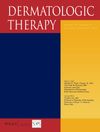 November 2016 in “Dermatologic Therapy”
November 2016 in “Dermatologic Therapy” "Dermatologic Therapy" offers expert treatment info for various skin diseases.
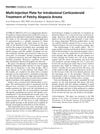 16 citations,
July 2000 in “Dermatologic surgery”
16 citations,
July 2000 in “Dermatologic surgery” The multi-injection plate is a less painful and more efficient method for treating patchy hair loss.
January 2003 in “Journal of Practical Aesthetic and Plastic Surgery” Both steroid treatments effectively regrow hair in severe alopecia areata.
1 citations,
January 2021 in “Dermatologic Therapy” Candida antigen is an effective and promising treatment for alopecia areata.
 53 citations,
January 2014 in “Journal of Cutaneous and Aesthetic Surgery”
53 citations,
January 2014 in “Journal of Cutaneous and Aesthetic Surgery” Microneedling combined with triamcinolone can safely stimulate faster hair regrowth in people with Alopecia Areata.
 August 2015 in “Dermatología Argentina”
August 2015 in “Dermatología Argentina” Frontal fibrosing alopecia causes hairline recession and eyebrow loss in postmenopausal women.
 2 citations,
January 2019 in “Annals of dermatology/Annals of Dermatology”
2 citations,
January 2019 in “Annals of dermatology/Annals of Dermatology” A patient experienced permanent hair loss due to an allergic reaction to a corticosteroid injection.
 1 citations,
July 2018 in “Journal of dermatology & cosmetology”
1 citations,
July 2018 in “Journal of dermatology & cosmetology” Hyaluronic acid successfully treated skin atrophy caused by corticosteroid injections.
 July 2024 in “JAAD Case Reports”
July 2024 in “JAAD Case Reports” Corticosteroid injections for hair loss may cause eye problems, so caution is needed.
 July 2023 in “Research Square (Research Square)”
July 2023 in “Research Square (Research Square)” Two patients got Cushing's syndrome after treatment with Triamcinolone Acetonide for mouth fibrosis, but recovered after stopping the treatment.
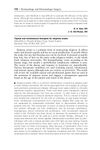 January 2012 in “The Year book of dermatology”
January 2012 in “The Year book of dermatology” Many treatments for alopecia areata have inconsistent results; for under 10s, use minoxidil with a corticosteroid, and for over 10s, add ILC and consider diphenylcyclopropenone for widespread cases.
 December 2023 in “International journal of research in dermatology”
December 2023 in “International journal of research in dermatology” Adding PRP to topical mometasone improves and speeds up alopecia areata treatment.
6 citations,
November 2020 in “Clinical Cosmetic and Investigational Dermatology” Both concentrations of triamcinolone acetonide are effective for hair regrowth in patchy alopecia areata, but 5 mg/mL is recommended to reduce side effects.
 1 citations,
October 2023 in “BMC oral health”
1 citations,
October 2023 in “BMC oral health” Two patients treated with TAC for mouth fibrosis improved but developed Cushing's Syndrome symptoms.
 3 citations,
March 2011 in “Informa Healthcare eBooks”
3 citations,
March 2011 in “Informa Healthcare eBooks” Acne in children varies by age and severity, requires a pediatric treatment approach, and may need diagnostic evaluation for underlying conditions.
 95 citations,
November 2016 in “Journal of The American Academy of Dermatology”
95 citations,
November 2016 in “Journal of The American Academy of Dermatology” Treatments for permanent hair loss from scarring aim to stop further loss, not regrow hair, and vary by condition, with partial success common.
 26 citations,
June 2019 in “The journal of investigative dermatology/Journal of investigative dermatology”
26 citations,
June 2019 in “The journal of investigative dermatology/Journal of investigative dermatology” Regenerative therapies show promise for treating vitiligo and alopecia areata.
 May 2007 in “Dermatologic Therapy”
May 2007 in “Dermatologic Therapy” Hair care practices like using relaxers and tight braiding can lead to permanent hair loss in black women.
11 citations,
January 2009 in “Acta Dermato Venereologica” Early and aggressive treatment can significantly regrow hair in discoid lupus erythematosus.

Both treatments for localized alopecia areata are equally effective.
 25 citations,
July 1994 in “Archives of Dermatology”
25 citations,
July 1994 in “Archives of Dermatology” A man's skin condition, pemphigus vulgaris, came back after he was treated with interleukin 2 for cancer.
15 citations,
June 1961 in “Archives of Dermatology” Triamcinolone can regrow hair in alopecia areata, but the effect is temporary.
28 citations,
May 1998 in “Journal of the American Academy of Dermatology” Scalp inflammation can cause multiple hairs to grow from one follicle.
 8 citations,
March 1979 in “International Journal of Dermatology”
8 citations,
March 1979 in “International Journal of Dermatology” Dr. Vera H. Price's 1979 work emphasizes the importance of accurate diagnosis and personalized treatment for hair loss.
 May 2023 in “Journal of medical case reports”
May 2023 in “Journal of medical case reports” A young girl with skin and scalp conditions showed some improvement with treatment.

Combining hydroxychloroquine and pimecrolimus can effectively treat hair loss from discoid lupus.
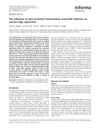 1 citations,
December 2012 in “Journal of Dermatological Treatment”
1 citations,
December 2012 in “Journal of Dermatological Treatment” Injecting triamcinolone acetonide near surgical cuts doesn't greatly affect wound healing but may help in areas with less tension.
 49 citations,
November 1992 in “Archives of dermatology”
49 citations,
November 1992 in “Archives of dermatology” Different treatments for alopecia areata have varying success rates and side effects; intralesional steroids are most effective.
 118 citations,
April 1998 in “Dermatologic Clinics”
118 citations,
April 1998 in “Dermatologic Clinics” Finasteride and minoxidil are effective for hair regrowth, while treatments for alopecia areata have varying success and continuous treatment is necessary.
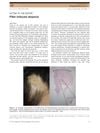 6 citations,
June 2019 in “Journal of dermatology”
6 citations,
June 2019 in “Journal of dermatology” Dermal fillers can cause hair loss, so dermatologists should be aware.
























